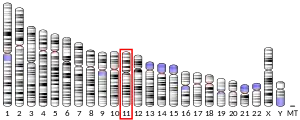Pepsinogen 3, group I (pepsinogen A)
Pepsinogen 3, group I (pepsinogen A) is a protein that in humans is encoded by the PGA3 gene. [3]
| PGA3 | |||||||||||||||||||||||||||||||||||||||||||||||||||
|---|---|---|---|---|---|---|---|---|---|---|---|---|---|---|---|---|---|---|---|---|---|---|---|---|---|---|---|---|---|---|---|---|---|---|---|---|---|---|---|---|---|---|---|---|---|---|---|---|---|---|---|
| Identifiers | |||||||||||||||||||||||||||||||||||||||||||||||||||
| Aliases | PGA3, pepsinogen 3, group I (pepsinogen A), pepsinogen A3 | ||||||||||||||||||||||||||||||||||||||||||||||||||
| External IDs | HomoloGene: 68135 GeneCards: PGA3 | ||||||||||||||||||||||||||||||||||||||||||||||||||
| |||||||||||||||||||||||||||||||||||||||||||||||||||
| |||||||||||||||||||||||||||||||||||||||||||||||||||
| |||||||||||||||||||||||||||||||||||||||||||||||||||
| |||||||||||||||||||||||||||||||||||||||||||||||||||
| Wikidata | |||||||||||||||||||||||||||||||||||||||||||||||||||
| |||||||||||||||||||||||||||||||||||||||||||||||||||
Function
This gene encodes a protein precursor of the digestive enzyme pepsin, a member of the peptidase A1 family of endopeptidases. The encoded precursor is secreted by gastric chief cells and undergoes autocatalytic cleavage in acidic conditions to form the active enzyme, which functions in the digestion of dietary proteins. This gene is found in a cluster of related genes on chromosome 11, each of which encodes one of multiple pepsinogens. Pepsinogen levels in serum may serve as a biomarker for atrophic gastritis and gastric cancer.
References
- GRCh38: Ensembl release 89: ENSG00000229859 - Ensembl, May 2017
- "Human PubMed Reference:". National Center for Biotechnology Information, U.S. National Library of Medicine.
- "Entrez Gene: Pepsinogen 3, group I (pepsinogen A)". Retrieved 2017-08-25.
Further reading
- Shiotani A, Iishi H, Uedo N, Kumamoto M, Nakae Y, Ishiguro S, Tatsuta M, Graham DY (2005). "Histologic and serum risk markers for noncardia early gastric cancer". Int. J. Cancer. 115 (3): 463–9. doi:10.1002/ijc.20852. PMID 15688378. S2CID 41463184.
- Pimanov SI, Makarenko EV, Voropaeva AV, Matveenko ME, Voropaev EV (2008). "Helicobacter pylori eradication improves gastric histology and decreases serum gastrin, pepsinogen I and pepsinogen II levels in patients with duodenal ulcer". J. Gastroenterol. Hepatol. 23 (11): 1666–71. doi:10.1111/j.1440-1746.2007.04983.x. PMID 17559360. S2CID 30895361.
- Kamangar F, Diaw L, Wei WQ, Abnet CC, Wang GQ, Roth MJ, Liu B, Lu N, Giffen C, Qiao YL, Dawsey SM (2009). "Serum pepsinogens and risk of esophageal squamous dysplasia". Int. J. Cancer. 124 (2): 456–60. doi:10.1002/ijc.23918. PMC 2605159. PMID 18844222.
- Abe Y, Iijima K, Koike T, Asanuma K, Imatani A, Ohara S, Shimosegawa T (2009). "Barrett's esophagus is characterized by the absence of Helicobacter pylori infection and high levels of serum pepsinogen I concentration in Japan". J. Gastroenterol. Hepatol. 24 (1): 129–34. doi:10.1111/j.1440-1746.2008.05691.x. PMID 19196398. S2CID 2816506.
- Peitz U, Wex T, Vieth M, Stolte M, Willich S, Labenz J, Jaspersen D, Lind T, Malfertheiner P (2011). "Correlation of serum pepsinogens and gastrin-17 with atrophic gastritis in gastroesophageal reflux patients: a matched-pairs study". J. Gastroenterol. Hepatol. 26 (1): 82–9. doi:10.1111/j.1440-1746.2010.06413.x. PMID 21175799. S2CID 23091933.
- Shafaghi A, Mansour-Ghanaei F, Joukar F, Sharafkhah M, Mesbah A, Askari K, Geranmayeh S, Mehrvarz A, Souti F, Sokhanvar H, Fakhrieh S, Aminian K, Yousefi-Mashhour M, Khosh-Sorur M, Rasoulian J (2013). "Serum gastrin and the pepsinogen I/II ratio as markers for diagnosis of premalignant gastric lesions". Asian Pac. J. Cancer Prev. 14 (6): 3931–6. doi:10.7314/apjcp.2013.14.6.3931. PMID 23886209.
- Tu H, Sun L, Dong X, Gong Y, Xu Q, Jing J, Long Q, Flanders WD, Bostick RM, Yuan Y (2015). "Temporal changes in serum biomarkers and risk for progression of gastric precancerous lesions: a longitudinal study". Int. J. Cancer. 136 (2): 425–34. doi:10.1002/ijc.29005. PMC 4354768. PMID 24895149.
This article incorporates text from the United States National Library of Medicine, which is in the public domain.

